Marketing Head Job Description: Complete Role Guide and Performance KPIs
Understanding the Key Duties and Performance Indicators for Marketing Heads Today
Blogby JanAugust 03, 2025

The Marketing Head position has become one of the most critical leadership roles in modern business, directly influencing company growth, brand perception, and revenue generation. In today's data-driven marketplace, successful Marketing Heads combine strategic vision with analytical expertise to drive measurable business results.
Organizations with strong marketing leadership experience 19% faster revenue growth and 15% higher profitability compared to their peers. This performance difference stems from the Marketing Head's ability to align marketing initiatives with business objectives while adapting quickly to changing market conditions and consumer behaviors.
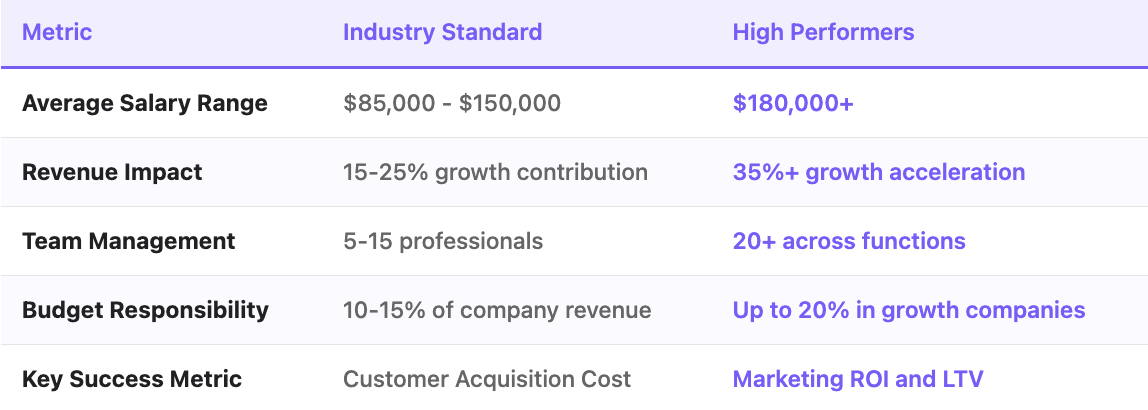
What is a Marketing Head?
A Marketing Head is a senior executive responsible for developing, implementing, and optimizing comprehensive marketing strategies that drive brand awareness, customer acquisition, and revenue growth. They lead marketing teams, manage substantial budgets, and ensure all marketing efforts support broader business objectives.
The role encompasses strategic planning and execution, team leadership and development, budget management and optimization, brand positioning and messaging, digital transformation and technology adoption, and performance measurement and reporting. Modern Marketing Heads operate at the intersection of creativity and analytics, using data insights to inform strategic decisions while maintaining brand authenticity and customer engagement.
Marketing Head vs. Other Marketing Roles
Understanding the distinction between Marketing Head and other marketing positions helps clarify organizational structure and career progression paths.
Marketing Head vs. Marketing Manager represents a significant step up in responsibility and scope. While Marketing Managers focus on executing specific campaigns and managing day-to-day activities, Marketing Heads develop overall strategy and vision. The Marketing Head typically manages multiple managers and has budget authority, whereas Marketing Managers implement allocated budgets within defined parameters.
Marketing Head vs. Chief Marketing Officer (CMO) differs primarily in organizational level and scope. CMOs operate at the C-suite level with broader strategic influence across the entire organization, while Marketing Heads typically report to CMOs or CEOs and focus specifically on marketing function excellence. In smaller organizations, these roles may overlap significantly or be combined into a single position.
Marketing Head vs. VP of Marketing often varies by company size and structure. Both roles involve strategic planning and team leadership, but VP positions may carry more corporate influence and cross-functional responsibility. The terminology often reflects company hierarchy preferences rather than fundamental differences in responsibility.

Core Marketing Head Responsibilities
The Marketing Head role encompasses eight critical responsibility areas that define success in the position.
Strategic Marketing Planning forms the foundation of effective marketing leadership. This involves conducting comprehensive market research to understand customer needs, competitor activities, and industry trends. The Marketing Head develops multi-year marketing strategies that align with business objectives, identifying target markets and customer segments while creating positioning strategies that differentiate the brand in competitive markets. They establish key performance indicators and success metrics that track progress toward strategic goals.
Team Leadership and Development requires building and managing high-performing marketing teams across various specializations. The Marketing Head recruits top marketing talent, develops career progression paths, and creates training programs that enhance team capabilities. They foster collaborative cultures that encourage creativity and innovation while maintaining accountability for results. Effective team leadership includes performance management, goal setting, and providing mentorship that develops future marketing leaders.
Budget Management and Resource Allocation involves overseeing substantial marketing budgets and ensuring optimal return on investment. The Marketing Head allocates resources across different marketing channels and campaigns, tracks spending against performance metrics, and adjusts budget distributions based on results. They prepare budget forecasts, justify marketing investments to senior leadership, and implement cost control measures that maximize efficiency without compromising effectiveness.
Brand Strategy and Positioning encompasses developing compelling brand narratives that resonate with target audiences. The Marketing Head ensures consistent brand messaging across all channels and touchpoints, manages brand reputation and perception, and adapts brand positioning to market changes and opportunities. They oversee brand guidelines, monitor brand performance metrics, and protect brand equity through strategic decision-making.
Digital Marketing and Technology Management has become increasingly important as businesses shift toward digital-first strategies. The Marketing Head oversees digital marketing channels including social media, email marketing, content marketing, search engine optimization, and paid advertising. They evaluate and implement marketing technology solutions, manage marketing automation platforms, and ensure teams have the tools needed for success.
This technological aspect presents significant challenges for many Marketing Heads. Managing multiple data sources, tracking campaign performance across channels, and maintaining data quality requires sophisticated systems and processes. Many organizations struggle with data fragmentation across various marketing tools, making it difficult to get comprehensive views of customer journeys and campaign effectiveness. These same data challenges affect Sales Operations teams who must coordinate marketing and sales data for comprehensive revenue operations.
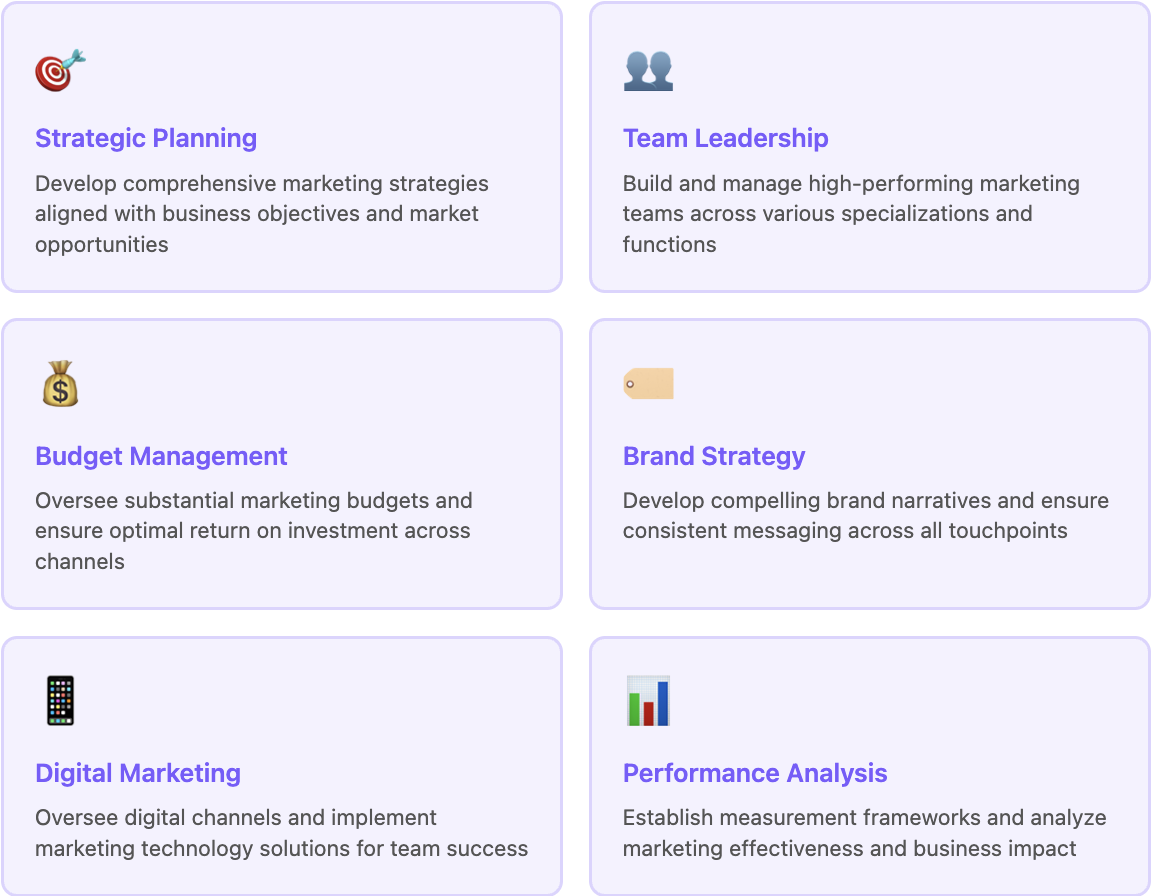
Campaign Development and Execution involves creating integrated marketing campaigns that drive awareness, engagement, and conversions. The Marketing Head oversees campaign planning from concept through execution, ensuring messages align with brand positioning and business objectives. They coordinate cross-channel campaigns, manage campaign timelines and deliverables, and optimize campaigns based on performance data.
Performance Analysis and Reporting requires establishing measurement frameworks that track marketing effectiveness and business impact. The Marketing Head analyzes campaign performance, customer acquisition metrics, and return on investment across all marketing activities. They prepare regular reports for senior leadership, identify optimization opportunities, and make data-driven recommendations for future strategies.
Cross-Functional Collaboration ensures marketing efforts support and enhance other business functions. The Marketing Head works closely with Chief Sales Officer and sales teams to align lead generation and nurturing activities, collaborates with product teams to support launches and positioning, and partners with customer success teams to enhance retention and expansion efforts. They participate in executive planning sessions and contribute marketing perspectives to broader business decisions.
Essential Skills for Marketing Heads
Successful Marketing Heads combine traditional marketing expertise with modern business acumen across several critical skill areas.
Strategic Thinking and Planning encompasses the ability to see long-term opportunities and translate them into actionable marketing strategies. This includes understanding market dynamics, competitive landscapes, and customer behavior patterns. Marketing Heads must balance short-term performance requirements with long-term brand building, making strategic decisions that drive sustainable growth.
Leadership and Team Management skills become crucial as Marketing Heads typically manage diverse teams with various specializations and skill levels. Effective leadership involves setting clear expectations, providing constructive feedback, and creating environments where team members can excel. This includes coaching and mentoring capabilities, conflict resolution skills, and the ability to inspire teams toward common goals.
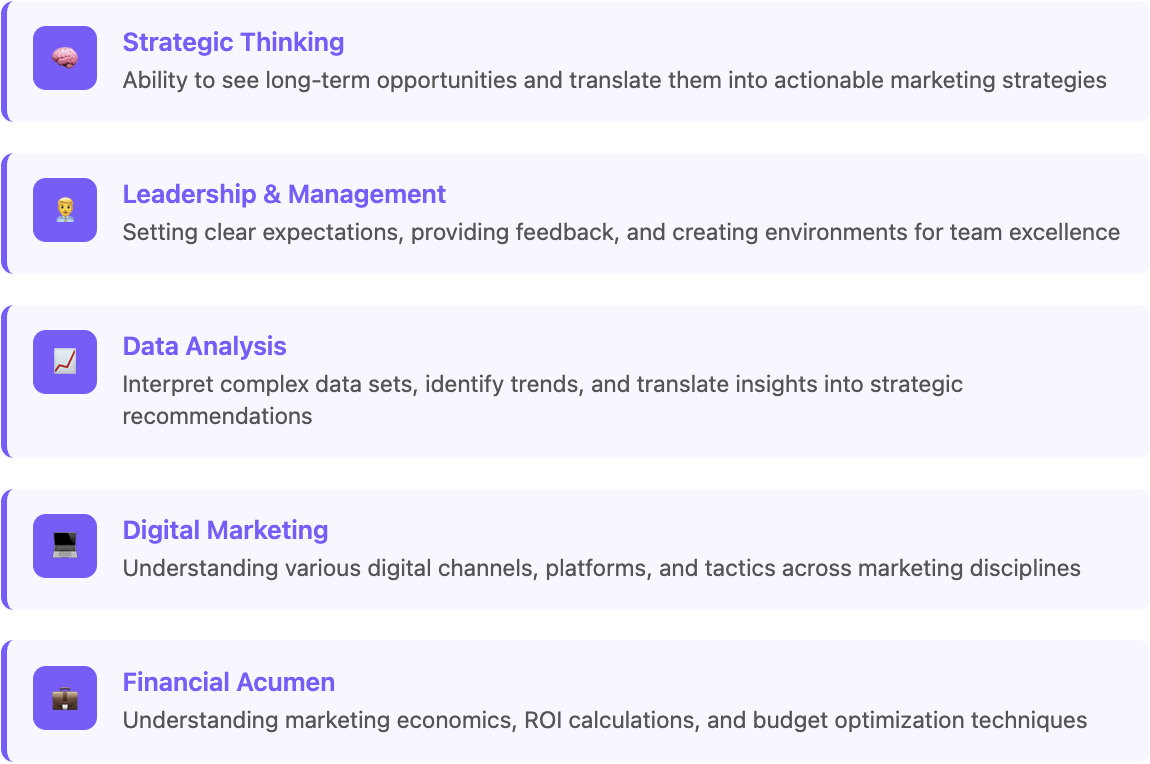
Data Analysis and Technology Proficiency has become essential in modern marketing. Marketing Heads must be comfortable with marketing analytics platforms, customer relationship management systems, and various marketing automation tools. They need to interpret complex data sets, identify trends and patterns, and translate insights into strategic recommendations.
The challenge many Marketing Heads face involves managing data from multiple sources and systems. Traditional approaches require extensive manual work to consolidate information from various marketing tools, social media platforms, email systems, and customer databases. This data fragmentation makes it difficult to understand complete customer journeys and measure true marketing ROI.
Modern Marketing Heads address these challenges through integrated data platforms that consolidate information from multiple sources. Solutions like Databar.ai enable access to 90+ data providers through a single interface, dramatically simplifying data management while improving accuracy and insights. This integration allows Marketing Heads to focus on strategy and optimization rather than data collection and consolidation.
Financial Acumen and Budget Management involves understanding marketing economics, return on investment calculations, and budget optimization techniques. Marketing Heads must justify marketing expenditures, demonstrate business impact, and make informed decisions about resource allocation across different channels and campaigns.
Digital Marketing Expertise encompasses understanding various digital channels, platforms, and tactics. This includes search engine marketing, social media advertising, content marketing, email marketing, and marketing automation. Marketing Heads don't need to be tactical experts in every area, but they must understand capabilities, limitations, and best practices across digital marketing disciplines.
Communication and Presentation Skills enable Marketing Heads to articulate marketing strategies, present results to leadership, and influence stakeholders across the organization. This includes written communication skills for developing strategic documents, presentation skills for board meetings and team communications, and interpersonal skills for building relationships and managing conflicts.
Marketing Head KPIs and Performance Metrics
Marketing Heads are evaluated based on comprehensive performance metrics that demonstrate business impact and marketing effectiveness.
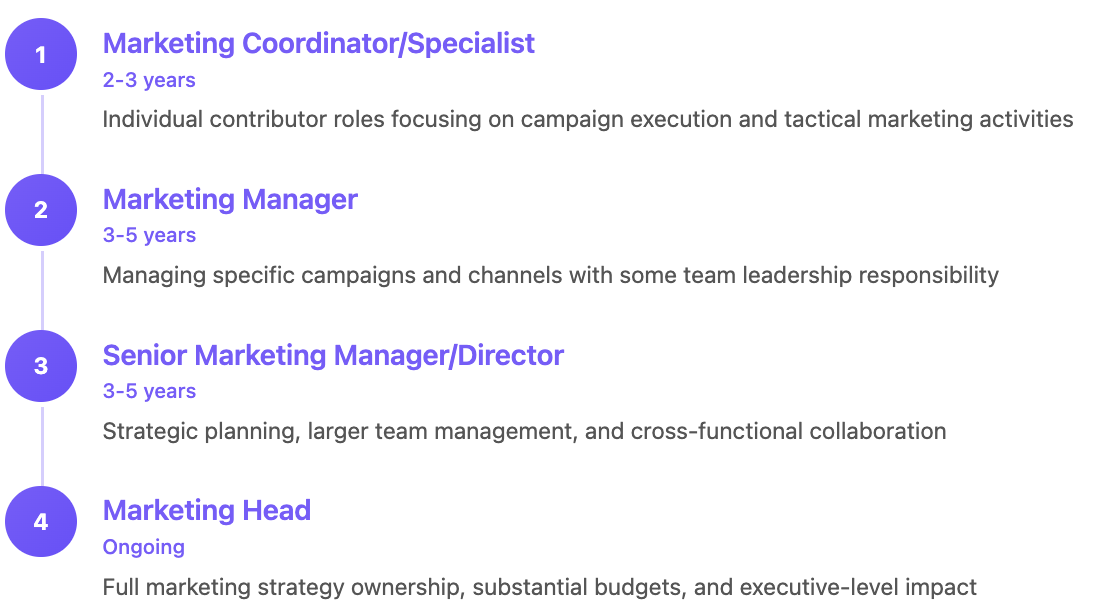
Revenue and Growth Metrics form the primary evaluation criteria for most Marketing Heads. Sales revenue growth measures the overall impact of marketing efforts on business performance, typically tracked monthly, quarterly, and annually. Marketing-sourced revenue specifically attributes revenue generation to marketing activities, helping demonstrate direct business impact. Customer acquisition cost (CAC) measures the efficiency of marketing spend in acquiring new customers, while customer lifetime value (CLV) demonstrates the long-term value of marketing investments.
Lead Generation and Conversion Metrics track the effectiveness of marketing activities in generating and nurturing potential customers. Marketing qualified leads (MQLs) measures the quantity and quality of leads generated through marketing efforts. Lead conversion rates track how effectively marketing generates leads that convert to sales opportunities. Sales qualified leads (SQLs) demonstrate marketing's contribution to sales pipeline development.
Brand Awareness and Engagement Metrics measure marketing's impact on brand perception and customer engagement. Brand awareness levels track recognition and recall among target audiences through surveys and market research. Website traffic and engagement metrics include unique visitors, page views, time on site, and bounce rates. Social media engagement encompasses followers, likes, shares, comments, and overall reach across social platforms.
Digital Marketing Performance Metrics evaluate the effectiveness of online marketing channels and campaigns. Search engine optimization performance includes organic traffic, keyword rankings, and search visibility. Email marketing metrics cover open rates, click-through rates, and conversion rates. Paid advertising performance includes cost per click, click-through rates, and return on ad spend across various platforms.
Operational Efficiency Metrics measure how effectively the marketing organization operates and delivers results. Marketing ROI calculates the return generated by marketing investments, typically expressed as a ratio or percentage. Campaign performance metrics track individual campaign effectiveness against objectives and benchmarks. Team productivity measures include campaign delivery timeliness, project completion rates, and resource utilization efficiency.
Customer Experience and Retention Metrics demonstrate marketing's impact on customer satisfaction and loyalty. Net Promoter Score (NPS) measures customer willingness to recommend the brand to others. Customer satisfaction scores track overall satisfaction with marketing touchpoints and experiences. Customer retention rates show marketing's contribution to maintaining customer relationships over time.
Marketing Head Salary and Compensation
Marketing Head compensation varies significantly based on company size, industry, location, and individual experience levels.
Entry-Level Marketing Heads with 5-8 years experience typically earn base salaries ranging from $85,000 to $120,000, with total compensation reaching $100,000 to $140,000 including bonuses and benefits. These positions often exist in smaller companies or represent internal promotions from marketing manager roles.
Mid-Level Marketing Heads with 8-12 years experience command base salaries from $120,000 to $180,000, with total compensation ranging from $140,000 to $220,000. These professionals typically manage larger teams and budgets while having proven track records of driving growth and managing complex marketing operations.
Senior Marketing Heads with 12+ years experience and substantial leadership accomplishments earn base salaries from $180,000 to $250,000+, with total compensation exceeding $300,000 in many cases. These roles often exist in large corporations or high-growth companies where marketing leadership directly impacts business success.

Industry and Location Variations create significant differences in compensation levels. Technology and SaaS companies typically offer the highest Marketing Head salaries, followed by financial services, healthcare, and consulting. Geographic location greatly impacts compensation, with major metropolitan areas commanding 20-40% premiums over national averages.
Performance-Based Compensation forms a substantial portion of most Marketing Head packages. Annual bonuses typically range from 20-40% of base salary, tied to achievement of revenue targets, lead generation goals, and other key performance indicators. Long-term incentives may include stock options or equity participation, particularly in high-growth companies.
Modern Marketing Head Challenges
Today's Marketing Heads face unprecedented challenges that require sophisticated solutions and strategic thinking.
Data Integration and Analysis Complexity represents one of the most significant challenges facing modern Marketing Heads. Marketing data exists across numerous platforms including CRM systems, email marketing tools, social media platforms, web analytics, advertising platforms, and customer service systems. Consolidating this information to understand complete customer journeys and measure true marketing ROI requires significant time and technical expertise.
Traditional approaches involve manual data extraction, spreadsheet manipulation, and custom reporting that consumes valuable time and introduces errors. Many Marketing Heads struggle with data quality issues, inconsistent metrics across platforms, and difficulty attributing results to specific marketing activities.
Technology Stack Management has become increasingly complex as marketing organizations adopt numerous specialized tools for different functions. Managing integrations, ensuring data flows correctly between systems, and optimizing tool utilization requires technical knowledge that many Marketing Heads lack. Tool proliferation also increases costs and complexity while potentially creating inefficiencies.
Customer Privacy and Compliance challenges continue expanding as regulations like GDPR, CCPA, and other privacy laws impact marketing activities. Marketing Heads must ensure compliance while maintaining marketing effectiveness, balancing personalization with privacy requirements, and adapting to changes in data collection and usage practices.
Attribution and Measurement Difficulties persist as customer journeys become more complex and span multiple touchpoints and channels. Determining which marketing activities drive results becomes challenging when customers interact with brands across numerous channels over extended periods. Marketing Heads need sophisticated attribution models and measurement frameworks to demonstrate marketing impact accurately.
Talent Acquisition and Retention presents ongoing challenges as demand for skilled marketing professionals exceeds supply in many markets. Marketing Heads compete for talent with strong analytical skills, digital expertise, and strategic thinking capabilities. Retaining team members requires competitive compensation, growth opportunities, and engaging work environments.
Solutions for Marketing Head Success
Leading Marketing Heads address these challenges through strategic approaches and technology adoption.
Integrated Data Management solutions consolidate marketing data from multiple sources into unified platforms that provide comprehensive views of customer interactions and marketing performance. Modern Marketing Heads leverage platforms like Databar.ai that provide access to 90+ data sources through single interfaces, eliminating the complexity of managing multiple data subscriptions and integrations.
These integrated approaches enable Marketing Heads to understand complete customer journeys, measure true marketing ROI, and optimize campaigns based on comprehensive data rather than fragmented insights. The time savings from automated data consolidation allows Marketing Heads to focus on strategy and optimization rather than data collection and manipulation.
Marketing Technology Optimization involves streamlining tool stacks to reduce complexity while maintaining functionality. Successful Marketing Heads regularly audit their technology investments, eliminate redundant tools, and ensure remaining platforms integrate effectively. They prioritize solutions that provide multiple capabilities over point solutions that create integration challenges.
Advanced Analytics and Attribution implementation helps Marketing Heads understand which activities drive results and optimize accordingly. This includes implementing multi-touch attribution models, customer journey analytics, and predictive modeling that improves decision-making and resource allocation.
Team Development and Training programs ensure marketing teams have skills needed for success in evolving marketing environments. Marketing Heads invest in continuous learning opportunities, cross-functional training, and leadership development that prepares team members for advancement while improving overall team performance. This development often includes understanding business development roles—explore how Director of Business Development responsibilities complement marketing leadership.
Career Path to Marketing Head
Aspiring Marketing Heads typically follow structured career progression paths that build necessary skills and experience.
Educational Foundation usually includes bachelor's degrees in marketing, business, communications, or related fields. Many Marketing Heads also pursue MBA degrees or specialized marketing certifications that demonstrate commitment to professional development and strategic thinking capabilities.
Progressive Experience Building follows typical patterns from individual contributor roles through management positions. The path often includes Marketing Coordinator or Specialist roles for 2-3 years, Marketing Manager positions for 3-5 years, Senior Marketing Manager or Director roles for 3-5 years, and then advancement to Marketing Head positions. Many Marketing Heads also benefit from understanding SDR career progression to better collaborate with sales development teams.
Key Skills Development should focus on strategic thinking, team leadership, data analysis, digital marketing expertise, and business acumen. Aspiring Marketing Heads benefit from cross-functional experience, project management skills, and exposure to different marketing channels and tactics.
Industry Experience and Specialization helps build expertise and credibility within specific markets or customer segments. Many successful Marketing Heads develop deep knowledge of particular industries, customer types, or marketing channels that differentiate them from generalist candidates.
Future of the Marketing Head Role
The Marketing Head position continues evolving as technology advances and customer expectations change.
Increased Technology Integration will require Marketing Heads to become more comfortable with artificial intelligence, marketing automation, and advanced analytics. The role will increasingly involve overseeing AI-powered marketing tools, interpreting machine learning insights, and optimizing automated marketing processes.
Greater Business Integration reflects the growing recognition of marketing's strategic importance to business success. Marketing Heads will have more influence on product development, customer experience design, and overall business strategy. This integration requires stronger business acumen and collaborative skills. As marketing becomes more technical, understanding roles like RevOps vs GTM Engineering helps Marketing Heads build effective cross-functional partnerships.
Enhanced Customer Experience Focus will drive Marketing Heads to think beyond traditional marketing metrics toward comprehensive customer experience optimization. This includes understanding customer journeys across all touchpoints, coordinating with customer success teams, and measuring long-term customer value rather than short-term conversion metrics.
Data Privacy and Ethics Leadership will become increasingly important as Marketing Heads navigate evolving privacy regulations and customer expectations. The role will require understanding legal requirements, implementing privacy-compliant marketing practices, and building customer trust through transparent data practices.
Conclusion
The Marketing Head role has evolved into a sophisticated leadership position that combines strategic vision with analytical expertise and operational excellence. Success in this role requires balancing creativity with data-driven decision making, team leadership with individual performance, and short-term results with long-term brand building.
Modern Marketing Heads face complex challenges including data integration, technology management, and evolving customer expectations. Those who succeed invest in comprehensive solutions, develop strong teams, and maintain focus on measurable business impact while building sustainable competitive advantages.
For organizations seeking Marketing Head candidates, prioritizing strategic thinking, leadership experience, and data proficiency will identify professionals capable of driving significant business growth. For aspiring Marketing Heads, developing these capabilities through progressive experience and continuous learning will create opportunities for career advancement and professional success.
The future belongs to Marketing Heads who can navigate complexity, drive innovation, and deliver measurable business results while building authentic customer relationships and sustainable competitive advantages. Organizations that invest in strong marketing leadership position themselves for accelerated growth and market success.
Frequently Asked Questions (FAQ)
What does a Marketing Head do? A Marketing Head develops and implements comprehensive marketing strategies, leads marketing teams, manages budgets, and drives brand awareness and customer acquisition. They combine strategic planning with hands-on management to achieve business growth objectives.
How much does a Marketing Head earn? Marketing Head salaries range from $85,000 to $250,000+ depending on experience, company size, and location. Total compensation including bonuses typically ranges from $100,000 to over $300,000 for senior positions.
What skills are most important for a Marketing Head? Critical skills include strategic thinking, team leadership, data analysis, digital marketing expertise, budget management, and communication skills. Modern Marketing Heads must also understand technology and be comfortable with data-driven decision making.
What's the difference between a Marketing Head and Marketing Manager? Marketing Heads have broader strategic responsibility, larger teams, and greater budget authority compared to Marketing Managers. They focus on overall strategy and vision while Marketing Managers handle specific campaigns and day-to-day execution.
How do you become a Marketing Head? The typical path includes progressive experience from marketing specialist to manager to director roles, usually requiring 8-15 years of experience. Educational requirements typically include bachelor's degrees in marketing or business, with many positions preferring MBA degrees.
What KPIs do Marketing Heads track? Key metrics include revenue growth, customer acquisition cost, marketing ROI, lead generation and conversion rates, brand awareness, website traffic, and team performance indicators. Specific KPIs vary based on company objectives and industry.
What are the biggest challenges for Marketing Heads? Major challenges include data integration across multiple platforms, technology stack management, measuring marketing attribution, talent acquisition and retention, and adapting to privacy regulations and changing customer expectations.
Do Marketing Heads need technical skills? While not required to be technical experts, successful Marketing Heads need comfort with marketing technology, data analysis tools, and digital marketing platforms. Understanding technology capabilities and limitations helps make better strategic decisions.
What industries pay Marketing Heads the most? Technology, SaaS, financial services, and healthcare typically offer the highest Marketing Head compensation. These industries value marketing leadership highly due to competitive markets and complex customer acquisition processes.
Is the Marketing Head role growing in importance? Yes, Marketing Heads are becoming increasingly strategic as companies recognize marketing's impact on business growth. The role continues expanding in scope and influence, making it an attractive career path for marketing professionals.
Related articles
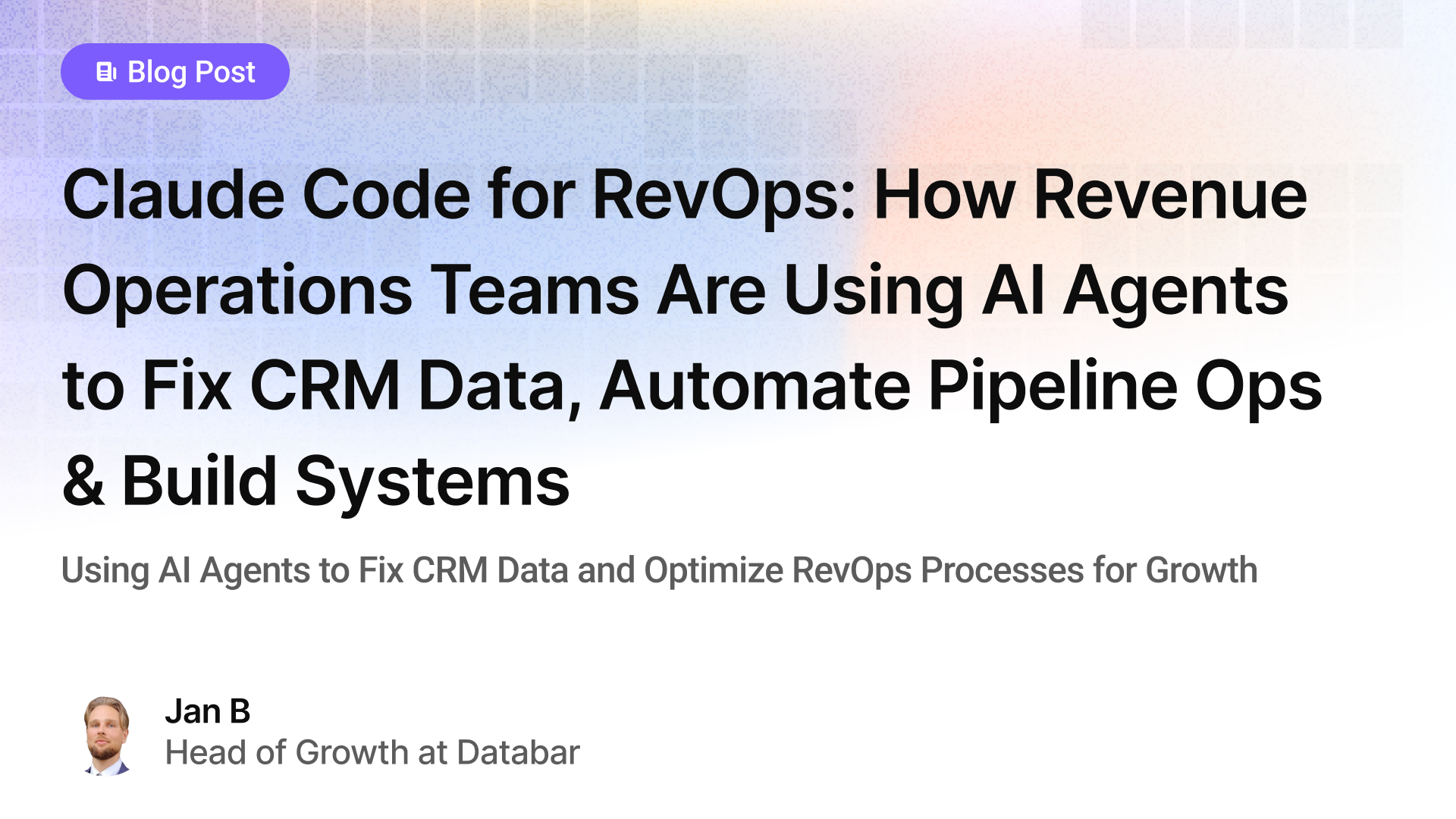
Claude Code for RevOps: How Revenue Operations Teams Are Using AI Agents to Fix CRM Data, Automate Pipeline Ops & Build Systems
Using AI Agents to Fix CRM Data and Streamline Revenue Operations for Scalable Growth
by Jan, February 24, 2026

Claude Code for Sales Managers: A Practical Guide to Deal Reviews, Rep Coaching, Pipeline Inspection, and Forecast Prep in 2026
Speed Up Coaching and Forecast Prep with Data You Can Trust
by Jan, February 23, 2026

How to Build a Client Onboarding System in Claude Code for GTM Agencies
How To Cut Client Onboarding from Weeks to Hours with Claude Code
by Jan, February 22, 2026

How to Run Closed-Won Analysis with Claude Code
How Claude Code Turns Your CRM Data into Actionable Sales Strategies
by Jan, February 21, 2026
